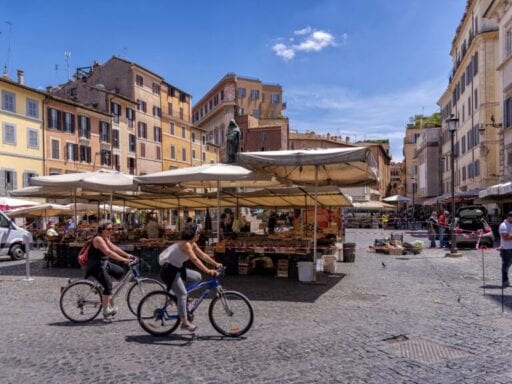The Italian prime minister says measures like reopening borders are needed for the economy.
Italian Prime Minister Giuseppe Conte announced on Saturday that Italy will allow European travelers to enter the country without quarantining beginning in June — a notable step in relaxing one of the most stringent coronavirus-spurred lockdowns in the world.
The prime minister acknowledged that easing border controls — combined with other steps his country is taking to return to normality — could spark a surge in cases of the virus, but argued that doing so was necessary for the economy.
“We’re facing a calculated risk in the knowledge that the contagion curve may rise again,” Conte said in an announcement. “We have to accept it otherwise we will never be able to start up again.”
He added that Italy “would end up with a strongly damaged economic and social structure” if it waited to relax distancing measures until a vaccine becomes available, something that may not happen for at least 12 to 18 months.
Beyond changes to its border policy, Italy is in the midst of an incremental winding down of many social distancing rules after it sharply reduced the rate at which Covid-19 was spreading within the country. On Saturday the country announced 153 deaths tied to coronavirus — the lowest number of daily fatalities since March 9.
In hopes of stimulating Italy’s economy, shops, hair salons, bars, and restaurants will be allowed to reopen Monday, but businesses are expected to observe strict hygiene rules and to keep people one meter (a little over three feet) apart.
As Reuters’ Silvia Aloisi and Giulio Piovaccari report, businesses plan to adopt a number of new practices to minimize risk to customers, and to encourage them to feel safe while out and about:
At Milan’s upscale Rinascente department store, guards will keep count through an app of how many people are in the store at any one time. Clothes tried on in changing rooms will be quarantined for 24 hours and shop assistants will spill perfumes on paper tissues rather than having customers handle testers. Access to restaurants will be strictly limited, with only family members allowed to sit close to each other.
And in the coming weeks, more and more of the lockdown will be reversed:
- On May 25, Italy will allow gyms, swimming pools, and sports centers to open up.
- On June 3, travelers from European Union countries can begin to enter Italy without going into a quarantine for two weeks, and a ban on traveling between different regions within the country will be scrapped.
- On June 15, cinemas and theaters are free to reopen their doors.
Some lockdown measures have already been relaxed. On May 4, Italy allowed construction, manufacturing, wholesale businesses and parks to reopen.
As with nonessential businesses that have reopened in the United States, Italian businesses are not expected to snap back to pre-coronavirus revenue overnight. In effort to help smooth the transition, Conte presented a package worth €55 billion to help Italy’s economy on Wednesday.
The stimulus package would, among other things, freeze corporate tax rates, provide grants to small businesses, recapitalize struggling companies, extend unemployment benefits, and provide “emergency income” to poor families.
Italian business leaders have been advocating for restarting the entire economy as quickly as possible, but generally Conte has emphasized that reopening must be extremely careful in order to avoid a relapse. For a time, Italy had the world’s worst coronavirus outbreak — as of May 17, nearly 32,000 Italians have died of Covid-19 — and it has one of the world’s highest rates of coronavirus-related deaths per capita: 52.5 per 100,000 people, according to an analysis by Johns Hopkins.
In order to keep the case count from rising, Conte said “maximum caution” must be a guiding principle as the country reopens.
Conte’s coronavirus advisers have also emphasized to the public that things won’t simply be returning to normal anytime soon.
“It’s not by chance that you use the same word, ‘depression,’ both economically and existentially,” Fabrizio Starace, a psychiatrist on Italy’s coronavirus task force, recently told the Washington Post. “The fantasy everyone is entertaining is that of a return to normalcy. Clearly our gradual recovery won’t match normalcy.”
Support Vox’s explanatory journalism
Every day at Vox, we aim to answer your most important questions and provide you, and our audience around the world, with information that has the power to save lives. Our mission has never been more vital than it is in this moment: to empower you through understanding. Vox’s work is reaching more people than ever, but our distinctive brand of explanatory journalism takes resources — particularly during a pandemic and an economic downturn. Your financial contribution will not constitute a donation, but it will enable our staff to continue to offer free articles, videos, and podcasts at the quality and volume that this moment requires. Please consider making a contribution to Vox today.
Author: Zeeshan Aleem
Read More



